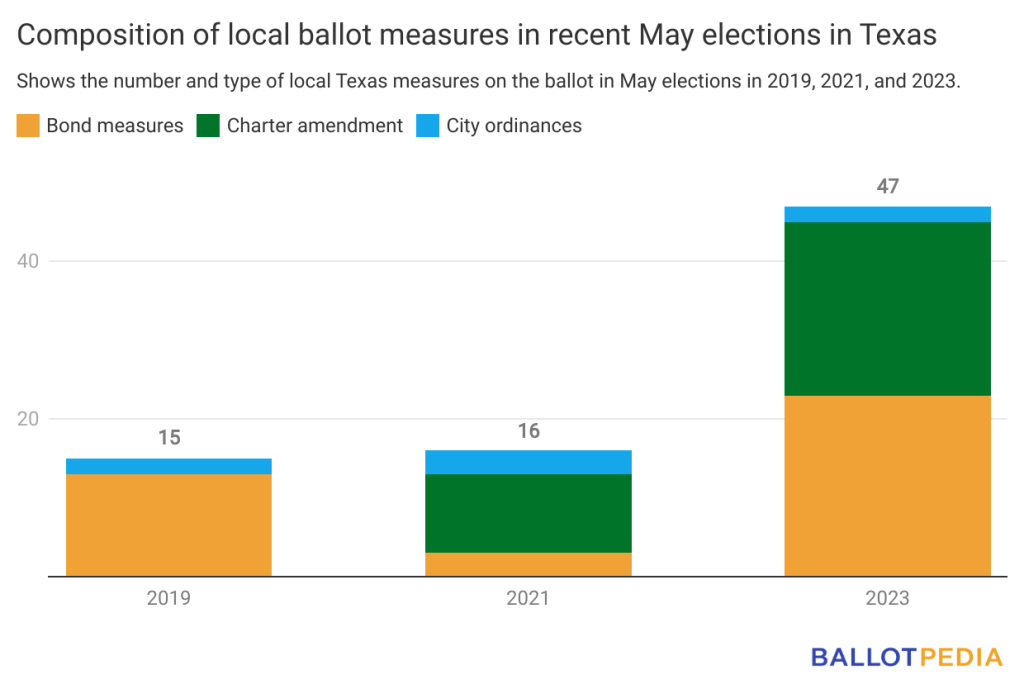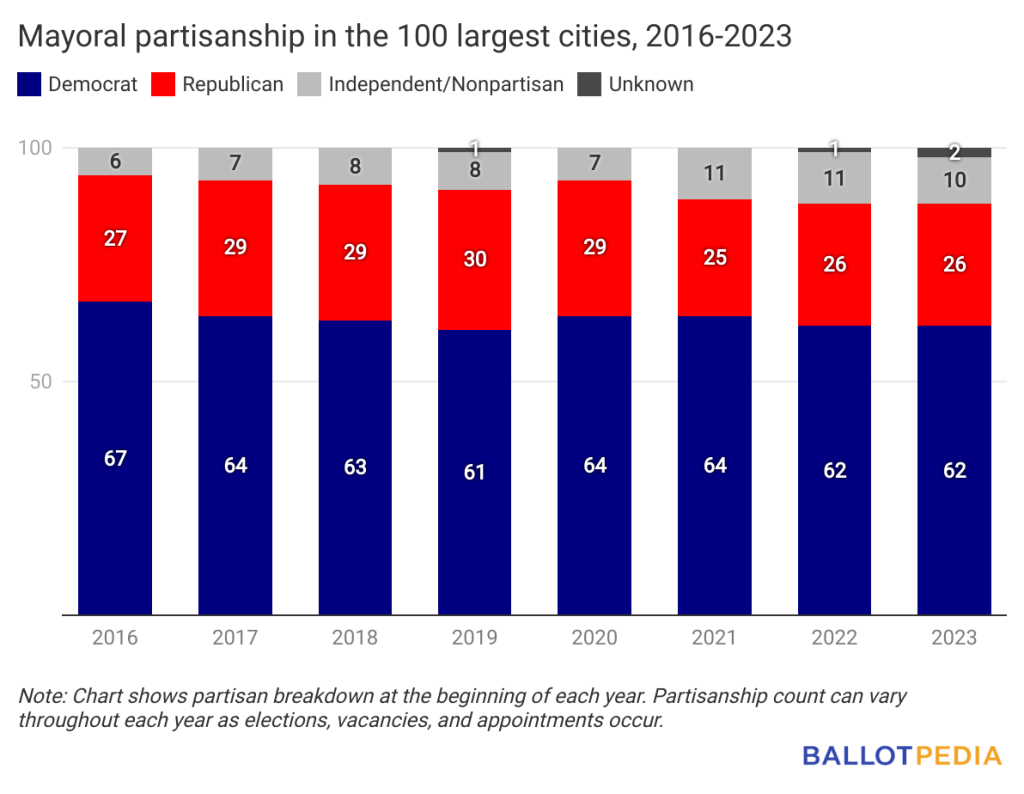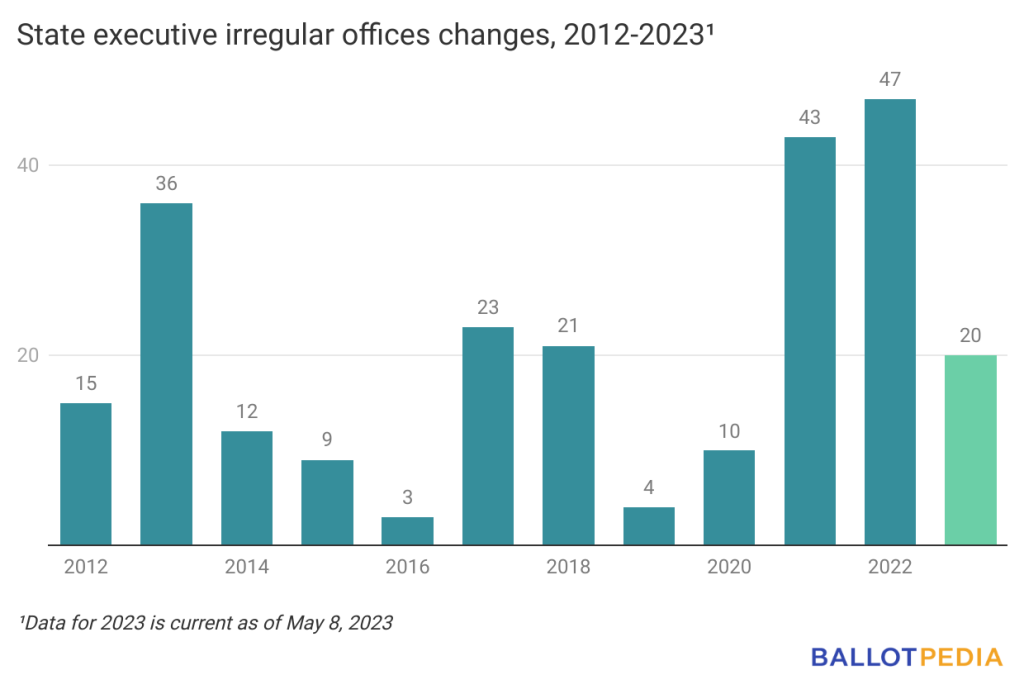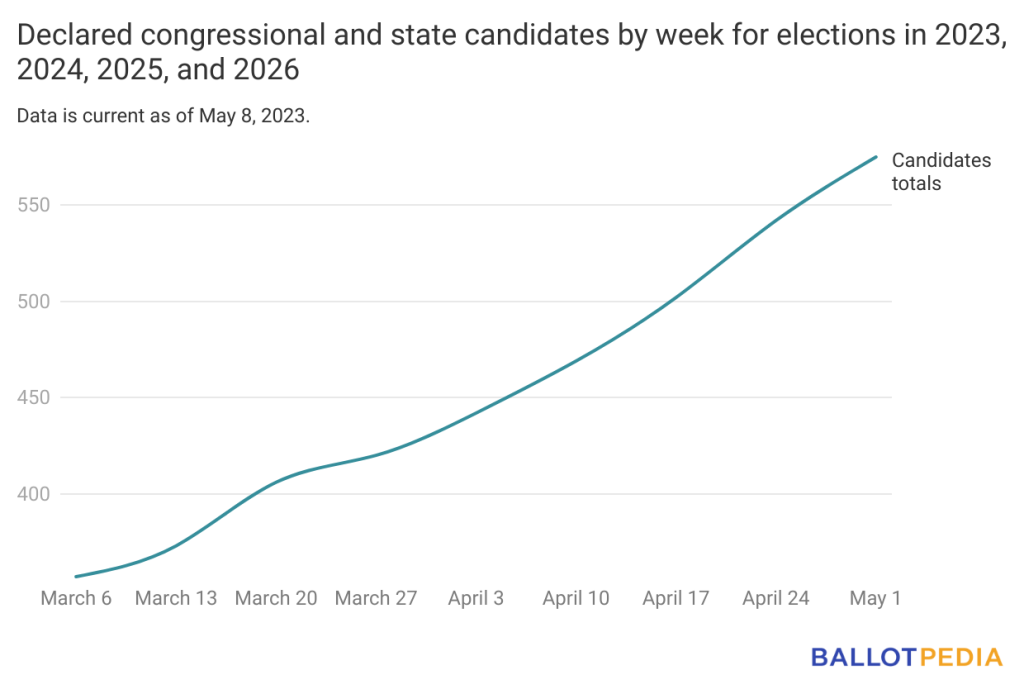Welcome to the Tuesday, May 9, Brew.
Here’s what’s in store for you as you start your day:
- A roundup of May 6 Texas election results
- Twenty state executive officials have left office early in 2023
- 37 candidates filed for federal and statewide offices last week
A roundup of May 6 Texas election results
Last week, we previewed local elections taking place across Texas on Saturday, May 6. Those elections have come and gone, so let’s take a broad look at what happened, beginning with ballot measures.
Ballot measure elections
In total, we covered 47 ballot measures on May 6. That was nearly three times more than we covered in May Texas elections in 2019 and 2021, mainly due to an increase in bond measures and charter amendments this year.

We’re still collecting results for some of the 47 measures (as of this writing, not all have been officially called). Those that received the most media attention were voted on in San Antonio, El Paso, and Austin.
San Antonio
Voters rejected Proposition A 71.63% to 28.37%. The amendment, a citizen-initiated measure, would have made the following changes:
- Established a city justice director appointed by the mayor and city council;
- Prohibited police from issuing citations or making arrests for certain misdemeanor marijuana possession offenses;
- Prohibited police from enforcing criminal abortion laws;
- Banned law enforcement use of no-knock warrants and chokeholds; and
The San Antonio Police Officers Association opposed the measure. President Danny Diaz said, “This wasn’t a party issue. This was a community issue. The work doesn’t stop tonight. The work continues so that we go out into the community so that they understand what we’re doing as police officers for them to make sure they are safe.”
Act 4 SA led the effort to get the measure on the ballot. Its Executive Director, Ananda Thomas, criticized the measure opponents, saying, “lies and the misinformation that were put out there backed by over $2 million. We know at the end of the day, in the long run, the people will always win over big-money interests.”
El Paso
Voters decided 11 charter amendments, including Proposition K, a citizen initiative related to the climate. Voters rejected Proposition K 83.5% to 16.47%.
Among other things, Proposition K would have established the Climate Department and the Climate Director, which would have carried out the amendment’s three policy goals—“to reduce the City’s contribution to climate change; second, to invest in an environmentally sustainable future; and third, to advance the cause of climate justice.”
El Paso Matters’s Diego Mendoza-Moyers said, “the Climate Charter sparked fierce opposition – and heavy campaign spending – from business groups such as the El Paso Chamber and the Houston-based Consumer Energy Alliance, which collectively poured over $1 million into television and web advertisements and campaign mailers urging voters to oppose the measure. Supporters of the Climate Charter spent about $30,000 in the election.”
Austin
Voters decided two competing initiatives related to police oversight. Voters supported Proposition A 79.86% to 20.14% and rejected Proposition B 81.09% to 18.91%. Equity Action sponsored Proposition A, while the Austin Police Association-backed Voters for Oversight and Police Accountability sponsored Proposition B.
Proposition A authorizes the Office of Police Oversight to investigate anonymous complaints, gather evidence and directly interview witnesses, and conduct a preliminary investigation of every complaint and determine whether a full investigation is warranted. The measure allows the Office of Police Oversight to analyze all force incident data and conduct random audits of body camera video.
Under Proposition B, certain provisions regarding the Office of Police Oversight would have been removed from the city Code of Ordinances, including a provision of the Office of Police Oversight to receive anonymous complaints.
On Saturday night, the Austin Police Association tweeted they were “taking immediate action to determine the city’s intentions regarding the implementation and enforcement of the illegal provisions contained in Prop A.”
According to Community Impact’s Ben Thompson, “The face-off between the ballot measures is the latest in
a series of high-profile policing decisions in the city through recent years, following a 2021 vote in which Austinites rejected a police staffing requirement and voted to ban low-level marijuana enforcement and no-knock raids in the city in last spring’s election. This year, the pending outcome of this May’s proposition election also led City Council to hold off on approving a new labor agreement with the police union.”
Mayoral and municipal elections
We covered mayoral elections in six cities on May 6. Incumbents in all six cities were running for re-election, and all incumbents were re-elected.
Three of those cities—Fort Worth, Garland, and Irving—have Republican mayors, while Dallas has a Democratic mayor. San Antonio’s mayor is an independent. We have been unable to verify the partisan affiliation of Arlington’s mayor.
We’re covering 40 mayoral elections this year, including upcoming elections on May 16 in Jacksonville, Fla., and Philadelphia, Pa.

We also covered city council and other elections on May 6 in the following cities and counties. Click to see results.
- Arlington: City council
- Dallas: City council
- Fort Worth: City council
- Garland: City council
- Irving: City council
- Plano: City council
- San Antonio: City council
- Collin County: Community college board of trustees
- El Paso County: Community college board of trustees
- Tarrant County: College board and regional water district board
Click below to see more of our Texas election coverage this year.
Twenty state executive officials have left office early in 2023
Since the start of the year, we’ve tracked 20 state executive officials who’ve left office early—the sixth highest number since we began tracking such unscheduled office changes in 2012.
When officials leave office before their terms expire we call that an irregular office change, which can occur when an official resigns or dies.

In 2023, four Republicans, four Democrats, and 12 nonpartisan officeholders have left office early thus far. Here’s how that breaks down by office type:
- 2 lieutenant governors
- 3 secretaries of state
- 2 attorneys general
- 1 treasurer
- 8 superintendent of schools/commissioner of education
- 3 agricultural commissioners
The latest state executive irregular office change happened May 8, when Oregon Secretary of State Shemia Fagan (D) officially resigned. Fagan left office following the Willamette Weekly’s reporting that a cannabis company was paying her for consulting services. In a statement announcing her resignation, Fagan said: “While I am confident that the ethics investigation will show that I followed the state’s legal and ethical guidelines in trying to make ends meet for my family, it is clear that my actions have become a distraction from the important and critical work of the Secretary of State’s office.”
Fagan is the third secretary of state to leave office early this year, following former Maryland Secretary of State John Wobensmith (R) and former Wisconsin Secretary of State Doug Follette (D).
Since we began tracking irregular office changes in 2012, there have been 39 irregular changes in public service commissioner offices—the most of any office. This is followed by the offices of secretary of state, with 25, and superintendent of public instruction, with 24. Since 2012, the most irregular office changes in a single state in a single year was in 2013 in Indiana. In total, Indiana, with 12, is the state with the most overall irregular office changes since 2012. Montana, with one in 2015, is the state with the fewest irregular office changes.
Click here to learn more about state executive irregular office changes.
37 candidates filed for federal and statewide offices last week
Last week, 37 candidates filed to run for congressional and state offices—including for elections in 2023, 2024, 2025, and 2026. Two weeks ago, we tracked 33 candidates who declared for congressional and state offices.

This year, we’ve tracked 612 declared candidates for federal and statewide offices.
Here’s a breakdown of the candidates who declared last week:
Of the partisan nature of the declared candidates:
- 20 are Democrats.
- 14 are Republicans.
- Three are minor-party candidates.
Of the offices tracked:
- 25 candidates filed for Congress.
- Eight candidates filed for state legislature.
- Two candidates filed for governorships.
- Two files for a lower state executive office.
Between March 6 and March 27, we tracked an average of 21 candidates who filed for federal or state elections. Between April 3 and April 24, that average increased to 33 candidates.
We cover elections for tens of thousands of offices across the country, and part of that work includes keeping tabs on the candidates who file to run for those offices. We’ll periodically bring you updates on how many candidates are signing up to run for state and congressional offices. We process both official and declared candidates.
Click here to read more about our definition of candidacy. Click the link below to see a list of all declared candidates for federal elections in 2024.

